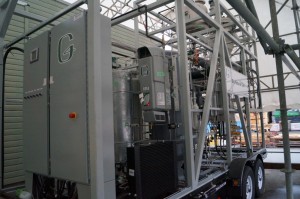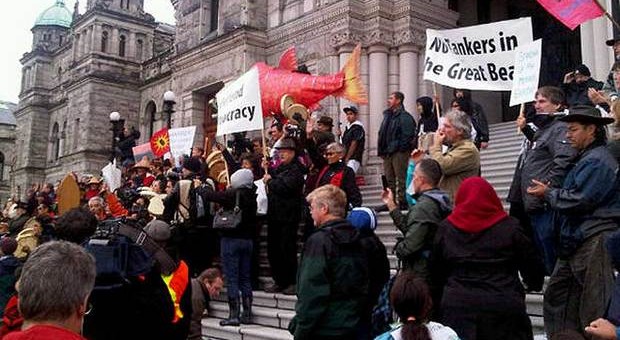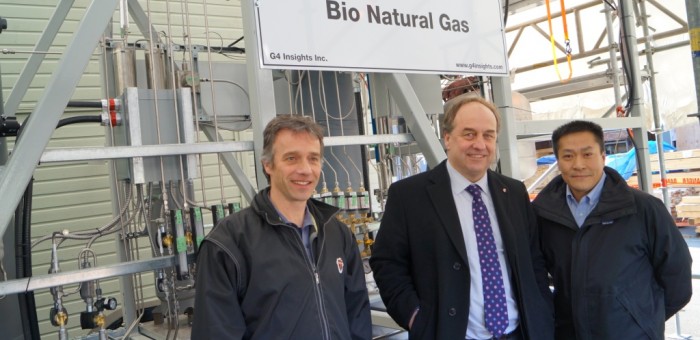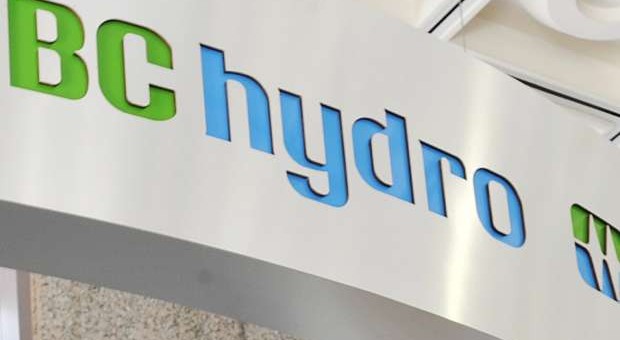Energy and Mines
Media Statement: Northern Gateway Conditional Approval ‘Deeply Disturbing’
Media Statement December 19, 2013
Northern Gateway, Joint Review Panel – Conditional ‘Yes’
For immediate release
Victoria BC – Today the National Energy Board’s Joint Review Panel released its report to the Federal Cabinet on Enbridge’s proposed Northern Gateway Pipeline. The panel’s conditional ‘yes’ is deeply concerning, considering the opposition by the BC Government, First Nations, environmental groups and the majority of the people of the province.
However, it is the 209 conditions that apply for the project to proceed which require emphasis. The Federal Cabinet must ensure that these conditions will be fully met before approving the project. It is unclear how the marine spill response conditions can be fully met, given the lack of scientific research and understanding of how diluted bitumen behaves in a marine environment.
“To date, not a single oil spill response study has adequately accounted for what would happen if DilBit were to spill in the ocean. The BC Government has said they require world class, effective spill response capacity, but don’t yet know how they will evaluate this. How can we possibly gauge how well prepared we are for a DilBit spill if the science, the studies and the evaluative criteria don’t even exist?” Andrew Weaver MLA
The question remains if the recommendations will meet the five requirements outlined by the BC Government, or even if the Northern Gateway Project itself can satisfy the conditions outlined by the Joint Review Panel. The Union of British Columbia Indian Chiefs remain firmly opposed, and their participation is vital for the project to move forward.
“It is deeply concerning that the Joint Review Panel has recommended the approval of the Northern Gateway Pipeline. The vast majority of British Columbians have made it clear they are opposed to the pipeline. My question to the Christy Clark is: Will you stand up for BC like you promised during the election and stop this pipeline, or will you stand by while the Federal government impose its will on our province?” Adam Olsen, Interim Leader BC Green Party
Mat Wright – Press Secretary Andrew Weaver MLA
mat.wright@leg.bc.ca
1 250 216 3382
Jobs, Economy and Northern Gateway
Photo above: Matt Babicki and Edson Ng, G4 Insights Inc.
The National Energy Board’s Joint Review Panel (JRP) has now released its final report approving the Enbridge Northern Gateway pipeline project. The project would see 525,000 barrels of the heavy oil diluted bitumen (dilbit) transported across British Columbia each day and loaded onto super tankers for shipment to international refineries. The project is yet another manifestation of a pattern of digging up Canada’s raw resources and shipping them to other countries with no value-added manufacturing or refining done locally. Yet what makes this proposal particularly problematic is the significant economic and environmental risk that we in B.C. face, should a spill occur.
If you look at the numbers, B.C. is projected to receive roughly $1.2 billion in tax revenue from the Northern Gateway pipeline over the span of 30 years—that’s only $40 million a year towards a $44 billion provincial budget. Yet, according to the UBC Fisheries Economic Research Unit, the economic cost of a single major tanker spill is estimates to be between $2.4 and $9.5 billion—that’s between 2 and 8 times more than the total 30-year economic benefit of the pipeline—in one spill.
Meanwhile, to date no oil spill response study has been able to account for dilbit; studies have only analyzed what would happen in the case of a spill from more commonly shipped crude oil. Unfortunately dibit is unlike other crude oils in that whereas most oils will float on the surface, up to 50% of dilbit will sink. Once that happens, we don’t know where it will go, how it will interact with currents and tides or how we could reasonably clean it up. In some areas it is projected that only 3% of floating crude oil could be cleaned up in the event of a spill. That number is already dismally low. With dilbit it would be even lower. According to the Department of Fisheries and Oceans’ own recent submission to Treasury Board: “Behaviour models specific to dilbit spills do not exist, and existing commercial models for conventional oil do not allow parameter specific modifications.”
Yet, we have an opportunity now to shift away from our old economic model of selling our raw resources solely for short-term profit and instead position ourselves for the long-term.
Let me offer two examples.
If we are going to develop the tar sands, and if we must transport oil along our coast, then at the very least let’s refine it first. This would offer two benefits: First, it would offer greater economic benefit for all British Columbians, as we would benefit from a value-added refining and spin-off petrochemical industry instead of shipping those jobs to Asia. Second, it would significantly decrease the environmental impact of a marine-based oil spill, as refined oil products (such as gasoline, diesel, or jet fuel) are much easier to clean up than dilbit. Let me be clear, this on its own is not an ideal solution and it does not protect us from the ecological consequences of a marine-based oil spill, but it certainly mitigates the risk when compared to shipping dilbit.
 However, building a future economy based solely on the exploitation of a depleting resource will not steer us towards the low-carbon pathway that so many other nations are choosing to follow. That’s why British Columbia should seize the opportunity of promoting the expansion of our clean technology (cleantech) industry. With our abundance of renewable natural resources, our highly educated workforce, our-business friendly tax structure and our reputation for innovation, British Columbia is uniquely positioned to become a leader in this sector—a sector that focuses on the production, storage, transmission and end-use of renewable energy. Just yesterday I toured Burnaby-based G4 Insights Inc’s portable thermochemical facility designed to produce compressed natural gas for vehicular transport from wood waste. We need to grow our nascent cleantech companies, like G4 Insights, rather than allow them to be scooped up and exported to the US. The cleantech sector offers long-term, high-paying and local jobs. Yet developing this industry to its full potential requires the market to be sent a strong signal from government that this is the direction we want to head.
However, building a future economy based solely on the exploitation of a depleting resource will not steer us towards the low-carbon pathway that so many other nations are choosing to follow. That’s why British Columbia should seize the opportunity of promoting the expansion of our clean technology (cleantech) industry. With our abundance of renewable natural resources, our highly educated workforce, our-business friendly tax structure and our reputation for innovation, British Columbia is uniquely positioned to become a leader in this sector—a sector that focuses on the production, storage, transmission and end-use of renewable energy. Just yesterday I toured Burnaby-based G4 Insights Inc’s portable thermochemical facility designed to produce compressed natural gas for vehicular transport from wood waste. We need to grow our nascent cleantech companies, like G4 Insights, rather than allow them to be scooped up and exported to the US. The cleantech sector offers long-term, high-paying and local jobs. Yet developing this industry to its full potential requires the market to be sent a strong signal from government that this is the direction we want to head.
Today’s JRP’s decision is simply a recommendation to the Federal Government. Ultimately it will be Prime Minister Stephen Harper and his cabinet who decide if the Northern Gateway pipeline project is approved. My challenge to both our Federal and Provincial governments is this: Let’s keep dilbit out of our coastal waters, keep the jobs in Canada, and position ourselves for tomorrow by building Canada’s capacity for cleantech.
Intervener for Trans Mountain Pipeline Hearings
Media Release – December 17th, 2013
Intervener Application for Kinder Morgan/Trans Mountain Pipeline Review
For Immediate Release
Victoria BC – Oak Bay-Gordon Head MLA Andrew Weaver and BC Green Party Interim Leader Adam Olsen will seek intervener status in the forth coming National Energy Board hearings on the proposed Kinder Morgan Trans Mountain pipeline expansion.
If approved the new pipeline would triple existing capacity from 300,000 to 890,000 barrels per day of diluted bitumen (DilBit) that would be transported from a delivery terminal near Edmonton, Alberta to a Kinder Morgan facility in Burnaby, BC. The proposed capacity is nearly double that of the Northern Gateway pipeline that has sparked so much opposition in B.C., with a capacity of 525,000 barrels per day.
The piped DilBit is for export, which will dramatically increase tanker traffic through Burrard Inlet, the Salish Sea, and Straight of Juan De Fuca—some of the most pristine, and economically significant, coastal environments in the province.
The City of Vancouver Mayor Gregor Robertson has noted an “unacceptable risk” over the dangers of a pipeline rupture, or tanker incident, which would have a profound economic and environmental impact on the metro region. These concerns have been echoed by First Nations, municipalities, environmental organizations and British Columbian’s along the pipeline and tanker routes.
“There is no science on how DilBit behaves if spilled into a marine environment. The risk is simply too high, and we should not be approving a project hoping that sometime in the future the capacity will be available to deal with a land- or sea-based DilBit disaster. Oak Bay-Gordon Head beaches and coastline face that tanker route; I will testify on the concerns being raised by my constituents” Andrew Weaver MLA
“The NEB hearings on Northern Gateway showed how Enbridge failed to adequately consult the people of British Columbia. We need to ensure everyone affected by the pipeline and tanker routes has the opportunity to have their say” Adam Olsen, Interim Leader, BC Green Party
The National Energy Board hearings will likely begin early in 2014 and could last up to 15 months. Kinder Morgan’s application comes ahead of the Joint Review Panel’s much anticipated decision on the proposed Northern Gateway Pipeline, which is will be released on Thursday, December 19th..
Media Contact
Mat Wright – Press Secretary Andrew Weaver MLA
mat.wright@leg.bc.ca
1 250 216 3382
Local Solar Company Wins Award
Media Statement December 16 2013
Local Solar Company Wins Award
For immediate release
Supporting Renewable Energy
Victoria BC – A Victoria based solar technology company has been awarded Canadian Distributor of the Year by the Canadian Solar Industries Association (CanSIA). HES-PV sold over 1000 home and commercial solar systems in 2013, one of over 650 companies in Canada heading towards a goal of generating 3.48 GW, enough energy to power 350 000 homes, by 2018.
“Despite the low electricity prices in Canada, the trend to take control of rising energy costs is made much easier for consumers since solar electric power has become so affordable. The cost of residential solar systems has dropped 40% over the past three years due to the global solar boom, and more Canadians are taking advantage of this technology” Dave Egles, founder HES
While recognizing the success of programs and initiatives like Solar Colwood (www.solarcolwood.ca) in the Capital Regional District, and others around the province and country, the patchwork of incentives at the municipal, provincial and federal level make it difficult for consumers to access clean energy technologies.
The renewable energy sector has enormous potential to reduce energy costs for residences and commercial operations, and to produce quality, well paid, jobs in all regions of British Columbia.
“I am delighted that a constituent Dave Egles and his company HES-PV have received this well-deserved award. I’ve recently toured two of his impressive installations in the riding of Oak Bay Gordon Head. Across British Columbia, clean technology companies have the potential to stimulate BC’s economy through innovation and job creation. This is a sector that deserves much greater support from all levels of government as we transition towards a resilient and sustainable 21st century economy” Andrew Weaver MLA.
About HES-PV – HES-PV is a Victoria based technology company, specializing in solar electric systems for homes and businesses. HES sold over 1000 systems in 2013, with a power production equivalent to the electrical needs of 1000 homes. HES also has facilities in Barrie Ontario, and participates in Ontario’s FIT and MicroFIT programs with large scale solar installations to help Ontario fulfill its commitment to replace its coal fired generation with clean renewable energy. Its’ founder, Dave Egles, started in the solar industry as the first commercial applications were being developed in 1988. He connected the first Net Metered Grid-Connected Solar House in BC that joined BC Hydro’s Net Metering Program. HES has a staff of 25 people.
Contact: Dave Egles degles@hespv.com 250-882-1533.
Mat Wright
Press Secretary: Andrew Weaver MLA
mat.wright@leg.bc.ca
1 250 216 3382
BC Hydro Rate Increase and Low-income Families
Over the past few weeks I have received a number of letters from constituents voicing their concerns about the recent announcement that BC Hydro will be raising the rates British Columbians pay for electricity.
Hydro Rates have been artificially low for a number of years now, based in large part because British Columbians are still benefiting from investments into hydroelectric dams from several decades ago. BC Hydro is now reinvesting in these capital projects, while also making investments in new projects to ensure that it can meet growing demand.
The reality that rates need to increase should not detract from a number of other concerns relating to BC Hydro’s operations including: political intervention, the role of BCUC and the overuse of deferral accounts, to name a few. All of these issues will play a role in determining future hydro rates. There is no simple solution to the challenges facing our public utility. We need to have a serious discussion about how we generate, manage, oversee and deliver our power.
In the meantime, however, there is also the need to ensure that decisions made today do not adversely affect those who are most vulnerable. Given that rates are going up dramatically over such a short period of time, we need to protect low-income earners. It is unacceptable to leave people choosing between essentials. In response to some of the concerns raised by constituents, I have sent the following letter to Minister Bennett:
Dear Minister Bennett,
Like you, I have been the recipient of a large number of emails expressing concern over the proposed BC Hydo rate hikes. I recognize that British Columbians presently pay some of the lowest electricity rates in North America as we benefit from capital investments made decades ago. I also recognize that our electricity rates will need to increase in the years ahead if we plan to update our aging infrastructure and bring on new sources of power.
Within our society, there are some who will struggle to pay the 28% increase over the next five years due to our high cost of living, particularly in Greater Vancouver and Victoria. As such, I am writing to suggest that your ministry consider introducing an energy rebate mirrored after the current carbon tax rebate for low income British Columbians. In addition, I assume that BC Hydro will continue its Power Smart for low-income households program.
By fixing the low-income energy rebate as a direct percentage of the carbon tax rebate, administrative overhead would be minimal. Such a rebate could be phased out with time, but its introduction is important to mitigate the economic shock to our lowest income residents.
Thank you in advance for considering this request.
Andrew Weaver
MLA Oak Bay-Gordon Head








